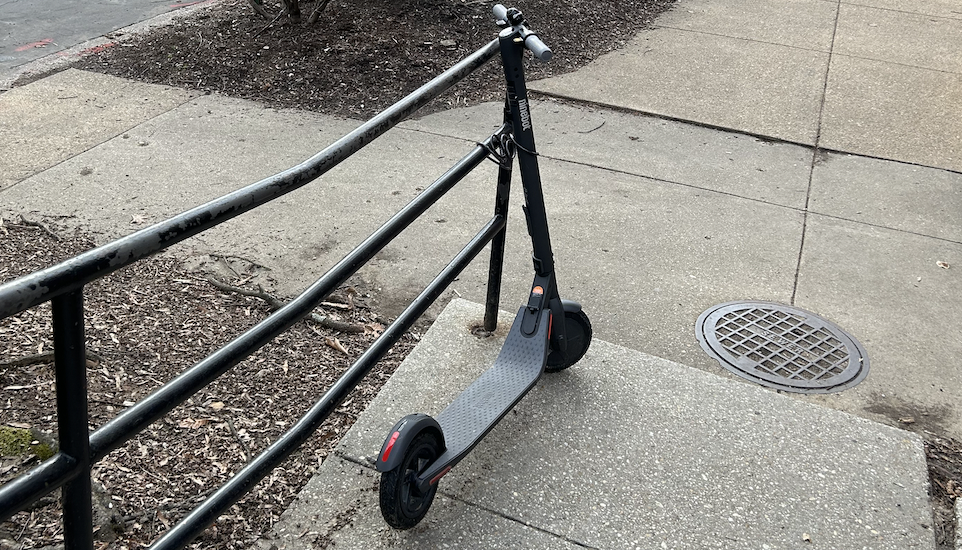![]()
On December 12, Georgetown University banned all lithium-ion micro-mobility devices, including scooters, from campus buildings. But a series of recent scooter thefts has made students reluctant to trust the security of the university’s outdoor storage — that reluctance continues today.
It is now March of 2024, and the war on scooters is nowhere near detente.
Scooter owners are left with two unsavory options: Disregard the new policy and risk retribution, or obey the policy and risk a stolen scooter. Students feel boxed in, and they believe the university is to blame.
When Nihal Nagesh (SOH ‘24) first mentioned to his friends that he was interested in buying a scooter last year, they warned him about thefts. He nevertheless decided that a scooter was a worthy investment. This past October, Nagesh locked his scooter to a bike rack outside the Center for Social Justice (CSJ). A few hours later, he went to grab his scooter, only to find it missing.
It appeared on Facebook Marketplace the next day.
He tried to acquire camera footage from the Georgetown University Police Department (GUPD), but was unable to obtain it. He asked GUPD for help recovering the scooter, but it was too late. According to Nagesh, GUPD stated that “we can’t do anything about it because now it is off campus.” Nagesh contacted the Metropolitan Police Department (MPD), but they could not take action without the camera footage.
“I literally just gave up,” he said.
Nagesh is not the only one who has experienced theft. One of his friends has had multiple locks stolen when thieves attempted — but failed — to steal his scooter. Another student had a scooter stolen outside of Lauinger Library.
According to GUPD crime logs, four scooters were stolen within a two-week period in January. The scooters were taken from the Southwest Quad bike racks, the dental school, VCW and Red Square.
In December, another scooter was stolen just three days after the university’s ban on indoor storage. Students are frustrated that the university has not provided reliably safe outdoor storage areas.
The December 12 policy announcement to the student body said “further information will be provided on the Environmental Health & Safety website in the early part of the Spring Semester including new charging options and storage location maps.”
The Office of the Campus Fire Marshal did not respond to a request for comment on the status of these new charging and storage locations.
While some students are upset, others have praised the policy. Students and staff credit the measure for prioritizing the safety of others, especially given the fire risk posed by scooters.
In February, New York City’s fire marshal testified before Congress in support of further lithium-ion battery regulation after fires caused by batteries killed 18 New York residents last year. That concern is shared among some at Georgetown.
“It is my responsibility to ensure residents live in a safe and secure environment,” said a Residential Assistant, who spoke outside their official capacity and asked not to be named. “The scooter ban may not be convenient, but it reduces a lot of risk and makes it easier for RAs to provide a safe living environment.”
Still, scooters offer students essential benefits, such as decreasing travel times. For athletes, or students who work off campus, scooters can halve travel time to practice sites and offices.
And for students with financial need, scooters have made it possible to find cheaper housing further from campus. Some, like Amira Fisher (CAS ‘24), feel this factor is overlooked.
“As a low income student who lives far away from campus because of how expensive the Georgetown neighborhood prices are, having a scooter to get to class everyday has been essential,” she said. “Not being able to store my scooter in campus buildings has caused a huge burden to me as my commute time has quadrupled.”
So, is the student response an overreaction or a well-supported objection to flawed university policy?
Regardless of the answer, the ask from students is simple.
“All that people in my position request is for a safe and secure option to store our scooters on-campus,” Fisher said. “It is not worth it for me to worry everyday if my scooter will still be on the bike lock by the time I am ready to head home from class.”











